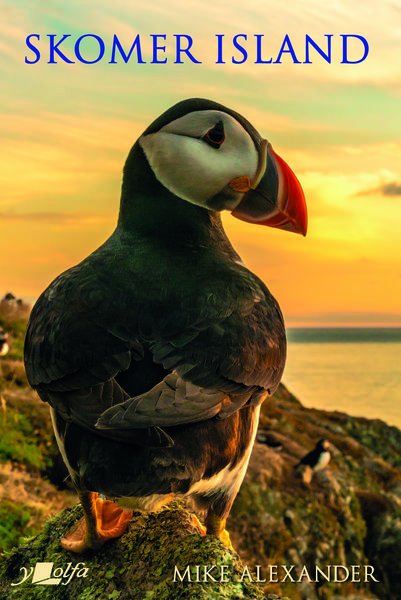Definitive book on the "jewel in the Welsh Wildlife crown" published
This week sees the publication of the definitive history and natural history of an island of international wildlife and scientific importance and one of the UK’s most beloved nature spots, Skomer Island. Skomer Island – Its history and natural history by Mike Alexander (Y Lolfa) is the most complete account of the island and its flora and fauna ever produced and is the result of the author’s years of meticulous research. The volume is beautifully illustrated throughout with hundreds the author’s own photographs of landscape, species and habitats, as well as never-seen-before photographs of the island’s former inhabitants.
“I’m passionate about the island and believe an account of Skomer’s history and in particular natural history is long overdue. Skomer is my cynefin, my spiritual home. I want to emphasise the long relationship between people and place: Skomer is a cultural landscape, shaped over thousands of years by people striving to make a living. I want to show how the island has evolved in response to changing human values, attitudes and interventions. I believe that we are part of the natural world and that we must maintain our connection with nature,” says Mike Alexander.
Skomer Island lies off the Pembrokeshire coast and became a National Nature Reserve in 1959. It has internationally important populations of seabirds, including puffins and Manx shearwaters, and large numbers of grey seal pups are born on the island’s beaches. The breath-taking displays of spring flowers, including coast-to-coast bluebells, give the island an almost unrivalled beauty, and it is also one of the best-preserved prehistoric landscapes in Britain. Mike Alexander describes Skomer as “a wonderful, wild place where nature is allowed to rule”, whilst in his Foreword to the book, Iolo Williams describes the island as “the jewel in the Welsh wildlife crown. It is a special place, the one Welsh reserve that can hold its head high amongst the world’s elite.”
Mike Alexander is an international authority in conservation management, and has worked in nature conservation for 50 years, 10 of which were spent as Warden of the island. He has remained in close contact since then and is now Chair of the Wildlife Trust South and West Wales and the Pembrokeshire Islands Advisory Committee, which looks after the island. He says:
“I started writing the book over 10 years ago. A book of this kind is inevitably a collation and distillation of research carried out and published by others. I spent long days in the Pembrokeshire archives, the Cardiff archives and the National Library of Wales – there was so much to discover. But the best part of the entire process was an opportunity to meet and talk to the descendants of the families who once farmed or lived on Skomer.”
Iolo Williams says of the book: “To say that this book is comprehensive is an understatement. Mike has gathered together every scrap of information about the island, from geology and topography to human and natural history.”
“The main purpose of the book is to celebrate such a uniquely wonderful place in the hope that it will inspire others to care for Skomer and our natural environment. It really is a book for the thousands of people who visit the island an attempt to help them gain a deeper understanding of the complexities and wonder of its wildlife. I wanted the text to be accessible to all, but not to sacrifice the relevance of the book to knowledgeable amateurs and professionals. I hope that my typical reader will be someone who enjoys the countryside and would like to know a little more on conservation management and the decisions we make,” said Mike.
Skomer Island is an incredibly comprehensive scholarly and analytical study of the island, which holds the relationship between people and place at the heart of the book – how Skomer has been moulded over the centuries to meet the needs of a succession of inhabitants and caretakers. This is a universal theme that transcends the boundaries of this tiny fragment of land and would be relevant to anyone who is curious about the environment we have created.
